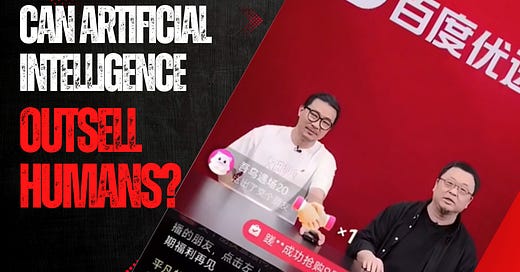Can Artificial Intelligence Outsell a Real Human?
The Future of Digital Influence is Already Here.
On June 15th, 2025, a livestream on a Chinese e-commerce platform pulled in an astonishing $7.65 million in sales.
But here’s the twist: the hosts weren’t real.
They were AI-generated avatars. The digital doubles of Luo Yonghao, one of China’s most famous livestreamers, and his co-host Xiao Mu. Created by Baidu’s generative AI model, these virtual clones mimicked Luo’s voice, mannerisms, jokes, and style, and so convincingly that many viewers probably couldn’t tell the difference.
And they outperformed him.
Just a month earlier, Luo livestreamed as himself on the same platform, ByteDance’s Youxuan, and brought in significantly fewer orders. The avatars beat him at his own game.
What made these AI avatars so effective?
Duration: The AI-hosted livestream lasted well over six hours. Luo’s previous human-hosted session? Just over four. AI doesn’t get tired. It doesn’t take pee breaks. That means more time, more viewers, more sales.
Cost: AI drastically reduces production costs. No studio. No travel. No crew. No high maintenance celebrities. Just a trained digital twin streaming from the cloud.
Precision: These avatars were trained on five years of Luo and Xiao Mu’s videos. They didn’t just look like the hosts, they performed like them. Their tone, timing, expressions; everything was tuned for engagement and familiarity.
Scalability: These digital hosts can, in theory, stream in multiple languages and markets simultaneously. Imagine your best salesperson speaking flawless Spanish, Mandarin, and English. 24/7.
A Turning Point, Not a Gimmick
Wu Jialu, head of research at Luo’s company BeFriends, called it a “DeepSeek moment”, a nod to China's open-source AI movement. In other words, this wasn’t a flashy stunt. It was a milestone. The beginning of something much bigger.
Even Luo himself admitted it. On Weibo, where he has over 1.7 million followers, he wrote:
“The digital human effect has scared me… I’m a bit dazed.”
That says a lot, coming from someone who built his empire on authenticity and live engagement.
The Avatar Isn’t Everything
Despite the hype, there are hurdles.
One major challenge is regulation. Platforms like Youxuan, Taobao, and Dunyan each have different rules about virtual hosts, especially around product promotion and viewer interaction. AI avatars must be trained not just to sell, but to comply.
And then there’s authenticity. Will consumers trust an AI influencer the way they trust a real person? Or will the novelty wear off? Platforms have already started cracking down on avatars that don’t engage in a “human” way.
Return rates are also an issue. Livestream shopping is notorious for impulse buying and AI may be too effective at selling, which could backfire if customers later regret their purchases.
What’s Next?
Baidu’s success is more than just a viral headline. It’s a glimpse of the near future. Digital avatars could soon be the face of livestream shopping, not just in China but globally. They’re cheaper, tireless, and multilingual.
The implications go beyond commerce. If AI can convincingly represent a person—emotionally, stylistically, and financially—what does that mean for the future of influence?
Who owns the avatar? Who’s responsible if it makes a mistake? And what happens to the real people it’s replacing?
As generative AI gets more capable and more accessible, this may be just the beginning. The age of the influencer isn’t over. But it’s about to get… synthetic.
Watch on YouTube, or listen on Spotify.



